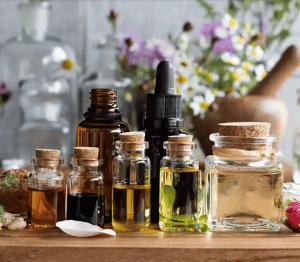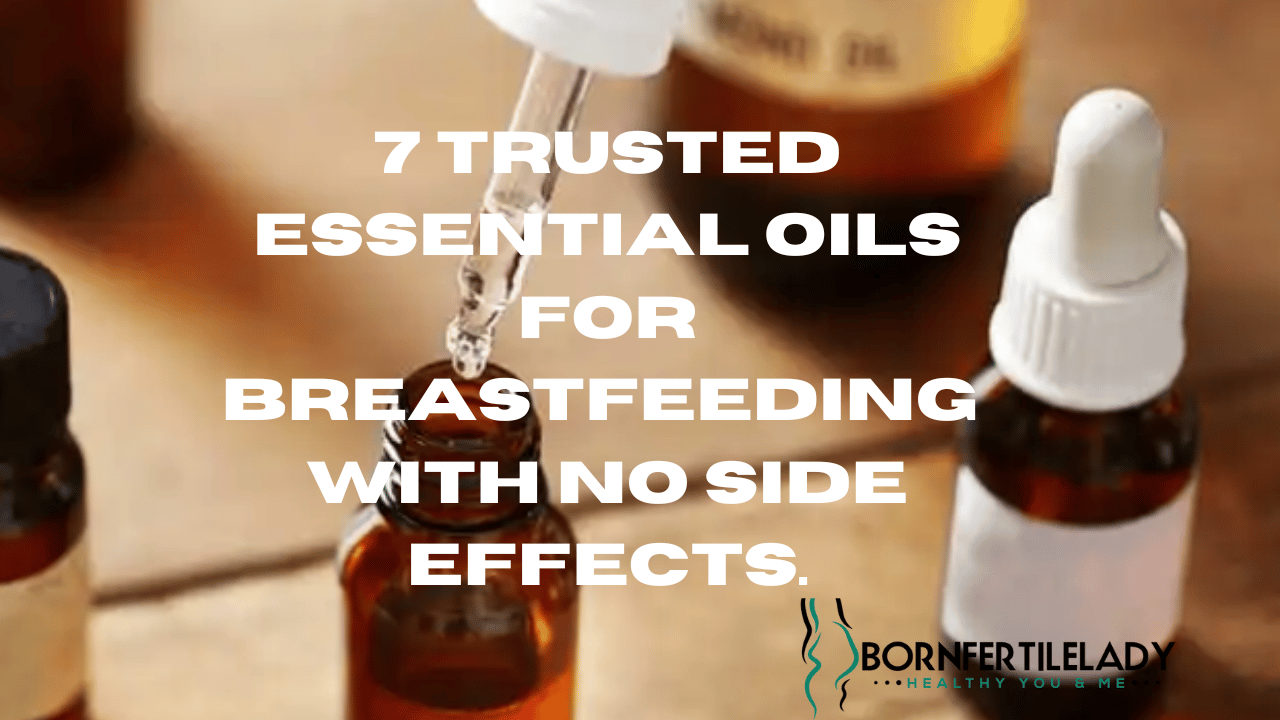Essential oils for breastfeeding are flammable liquids that are distilled from aromatic plants or herbs. They are employed in traditional medicine and aromatherapy for their medicinal, calming, and cosmetic benefits.
Some mothers may be concerned about using essential oils while nursing, even though they are generally regarded as safe.
And that brings us to the question: is it safe to use essential oils when breastfeeding?
This article will answer all your heartfelt questions concerning essential oils and breastfeeding.
Read on to learn more about this topic
What are essential oils?

These are chemical substances that have been taken from plants.
These substances, which are regarded as the plant’s essence, are responsible for the aroma and flavor of the plant.
The aroma and health advantages of each oil are specific to the plant from which it is produced.
Distillation or other mechanical methods, such as cold pressing, are used to extract them.
Once the chemical compounds holding the aroma have been collected, they are combined with carrier oils and made into essential oils, which are then prepared for use.
Importance of essential oil for breastfeeding to a nursing mother.
After giving birth, there are numerous typical problems that you could experience and which essential oils may be able to aid with.
They can be an excellent choice for a little more holistic healing like :
- sore nipples
- Production of breast milk
- sore breasts
- exhaustion and a desire for more rest
- uninterrupted sleep
- Support on a psychological level
- compromised immune system
- Support for the digestive system
- Energy
List of Essential oils for breastfeeding that is safe for you and your baby?
The following are a list of essential oil that is safe to be used when breastfeeding:
1. Basil
Basil essential oil is a galactagogue that can be used to boost milk production.
It can be consumed by using in cooking instead because of its great taste, which is also an option, or you can use it directly on your breasts.
You can apply one or two drops to your breasts, away from the nipple, by combining them with a carrier oil like coconut or olive oil.
Additionally, you can use it on your spine along your bra line.
If desired, basil can be used for more than 10 days.
2. Dill
Another essential oil that can be mixed with basil or fennel and is known to be a galactagogue is dill.
Dill is said to be a milder galactagogue, so using it first and seeing how it goes would be a fantastic idea.
You can experiment with it in a vegetable capsule or try using it in recipes, for example, le chicken salad dressing.
3. Fennel Seed
The most popular galactagogue, or substance that raises milk production, is fennel.
You can use Fennel oil to boost your milk production by taking two drops a day for up to ten days.
It can be consumed orally, as a vegetable capsule, or you can mix it into food or tea. Two drops with a teaspoon of honey is a common practice.
No other fennel essential oil brands should be consumed except fennel vitality products.
Fennel can also be applied topically.
Use one or two drops on your chest when mixed with carrier oil like coconut, olive, or jojoba oil.
Avoid applying it near your nipple.
Before nursing your child, simply wipe the area if it gets close to your nipple.
Fennel shouldn’t be used during pregnancy.
4. Clary Sage
Since clary sage contains antibacterial properties, it can be used therapeutically. When a mother has a low milk supply, it has been shown that clary sage can assist increase the quantity of breast milk.
Sage is known to decrease milk flow; clary sage does not.
It is preferable to avoid the breast area and to keep newborns away from the oil.
It is advised against using this specific oil during the postpartum time when babies utilize their sense of smell to coordinate because it has a strong aroma.
5. Lavender
The uses for lavender are endless. Lavender has many beneficial benefits, but breastfeeding and postpartum are two of the best times to utilize it.
Most significantly, lavender supports relaxation and restful sleep.
Stress is a frequent factor in milk supply reductions because it prevents the hormones that encourage milk production from being released.
When you’re feeling stressed or anxious, roll some lavender on your wrists and take a few deep breaths before going to bed. For better sleep for both you and the baby, disperse it before bed.
Start with just one drop if you’re diffusing in a space with a baby.
Read also: 10 Health Benefits of Having Sex During Pregnancy (is it safe?)
6. Peace And calming
A unique essential oil blend that will also help with stress relief is called Peace and Calming.
Just a few drops in your diffuser will fill your living room with the most peaceful vibes ever because it is so powerful.
Just opening the bottle only can make you calmer.
7. Stress Away
Another wonderful-smelling mix that supports mental well-being and reduces stress is called Stress Away.
The scent of Stress Away is energizing and combines vanilla and citrus.
Once more, everything that can make you feel more at ease, especially when pumping milk, will help you produce more milk.
Essential Oils To Avoid When Breastfeeding
Oregano
The use of oregano oil in herbal medicines has received a lot of support.
According to belief, the oil can treat infections like those brought on by the Candida fungus around the breast. However, there aren’t any conclusive clinical findings about the oil’s efficacy and safety.
Therefore, medical professionals advise against using it while nursing.
Peppermint
In herbal medicine, peppermint oil is frequently applied topically to cure nipple fissures.
This is accomplished because the oil has anti-inflammatory and anti-infection effects.
However, it should not be used when breastfeeding as it may decrease milk production.
Here are a few additional essential oils that you should generally avoid using while nursing:
- Blue Cypress
- Wintergreen
- Carrot Seed
- Myrrh
- Cinnamon Bark
- Idaho Tansy
- Nutmeg
- Hyssop
- Rosemary
Read also: 9 most powerful nursing books for breastfeeding mothers.
What to consider before using essential oils while breastfeeding?
Here are a few points to consider when using essential oil to match your expectations of it.
- Every essential oil has a different way of being used. While others might not be, some might be safe to consume or apply topically
Verify that essential oil is accepted as safe for oral usage before deciding to swallow it.
- Since the oil may enter breast milk, the majority of essential oil producers do not advise using it orally during breastfeeding
- Making sure that essential oils are pure is crucial. Buy oils of the highest purity from reputable brands.
- People respond differently to the wide range of essential oil uses, as they do to any use of essential oils.
- Essential oils are not the same as herbs. So, while a herb may be safe to consume while breastfeeding, its essential oil may not be
- The duration and dosage of essential oils differ. Some oils can be used for a long time in small doses without any harm.
- How frequently you empty your breasts—by nursing your child or pumping—has the most impact on how much milk you produce and not necessarily the essential oil used for breastfeeding.
so if you are placing a demand on your supply, you need to work hard to satisfy it.
Therefore, if you are concerned about your breast milk production, it is preferable to breastfeed more frequently or pump following nursing sessions.
- All essential oils do not have the same chemical makeup. For instance,
Therefore, It’s usually a good idea to seek advice from your doctor, midwife, and/or lactation consultant before beginning the use of any new drugs, dietary supplements, or essential oils when you’re pregnant or breastfeeding.
Advice on oil safety when around babies?
When and where you use your essential oils around your baby, be mindful. If you use any hot oils, such as cinnamon, clove, lemongrass, oregano, thyme, and peppermint, be sure to apply them to places where the baby won’t touch them Also, avoid diffusing the oils in a space that is too small or too enclosed for the baby. This is yet another useful guide for using essential oils on a newborn.
